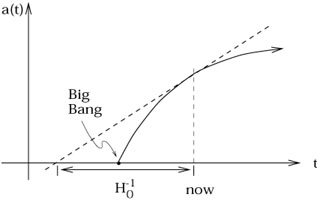From 'Fundamentals: Ten Keys to Reality', by Frank Wilczek :
"Running the movie of cosmic history backward in our minds, we found the galaxies all coming together to meet at a definite time. When did it happen? To calculate how long ago, we simply divide the distance a galaxy must travel by the speed at which it's moving. (Since a galaxy's speed is proportional to its distance according to Hubble's observations, we'll find the same result consistently whichever galaxy we choose.) Doing that, we estimate that galaxies were all smushed together about 20 billion years ago. More accurate calculations, which include how the velocities change over time due to gravity, yield a somewhat smaller result. Today's best estimate is that 13.8 billion years have elapsed since the big bang."
Since gravity is an attractive force, partially offsetting the expansion of the universe, shouldn't the estimated age be higher than the initial 20 billion years, not lower?
For instance, if astronomers, somehow, discovered that there was even more matter in the universe than estimated, wouldn't that cause them to revise the estimated age of the universe upwards, not downwards?
In other words, with gravity partially resisting and slowing down the expansion, wouldn't it have taken that much longer for the universe to reach its current size?
